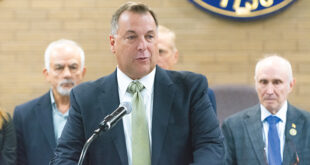
On the night the Board of Education was told it could save at least $675,000 a year by privatizing its paraprofessionals, one board member said the district should also outsource substitute teachers.
The idea came from the Board of Education’s finance committee chairman, Delvin Burton, after he told his colleagues that they’re looking at a more than $2 million shortfall in next year’s budget.
Schools Superintendent Edward Seto told the board the deficit is more like $2.5 million, and that doesn’t take into account a number of upcoming costs.
Burton said the two main budget savings ideas currently being discussed – privatizing paraprofessionals and cutting back on the use of consultants – wasn’t going to give them the cost savings they’d need to make up the deficit.
Burton said the district spends about $4,000 a day – or $1 million a year – on substitute teachers’ salaries.
He suggested the board issue a Request for Proposals for a company to study the district’s use of substitutes and what the costs would be if they were outsourced.
Another way to save money on the use of substitutes, he said, is to create “attendance incentives for teachers.”
Getting meaningful cost savings “is beyond what we can do on the consultant side,” he said. “Seventy percent of our budget is wrapped up in people.”
Burton also said that the board needed to make a decision that night on whether it wanted to privatize the paraprofessionals because the district needed to give the vendor – Hunterdon County Educational Services Commission – enough time to have a program in place by September.
But that idea was quickly shot down after it was criticized by board president Julia Presley, vice president Eva Nagy and board member Richard Arline..
Nagy said it would be “very difficult to make a decision like this without seeing the full budget.”
“This is a huge decision for the school district and the community,” Nagy said.
“I’m not comfortable making a decision of this magnitude without being able to review the data, process it and digest it,” Presley said.
The board instead voted to ask board business administrator John Calavano to schedule a special meeting in the next two weeks to discuss the issue.
In the meantime, the board will have some time to digest figures on privatizing the paraprofessionals – such as teachers’ aides – presented by Brian Bonanno, the district’s manager of administrative services.
Bonanno told the board that privatizing with Hunterdon County Educational Services would save the district at least $675,000 in the first year.
He said that number would increase in subsequent years because Hunterdon’s costs would not increase as rapidly as the district’s would.
While the district would make out well in the deal, not all the paraprofessional might.
Bonanno said the average salary the district pays paraprofessionals now ranges from $16,150 to $31,900. He said teh average salary range paid by Hunterdon is $17,131 to $29,509.
The average salary, including benefits and payroll costs, now paid to the district’s paraprofessionals is $42,000, Bonanno said. He said the average salary paid by Hunterdon would be $36,500, “a savings of $5,500 per paraprofessional.”
Benefits would also change, he said.
The district provides a health care plan for the paraprofessionals’ families; Hunterdon’s would only cover the paraprofessionals. Bonanno said families could be included in the Hunterdon plan with an additional fee.
He said the pension plan would stay the same.
B0nanno said the paraprofessionals would have to apply for their jobs, and that Hunterdon, aided by officials from the district, would determine who would be hired.
Responding to a question from board member Nancy LaCorte, Bonanno said that if paraprofessionals who apply and are hired had been working with specific students, they would again be assigned to those students.
On the other hand, Nagy said, “We’re at the risk of losing folks if they decide they don’t want to work for Hunterdon.”
 The Franklin Reporter & Advocate Eight Villages, One Community
The Franklin Reporter & Advocate Eight Villages, One Community

